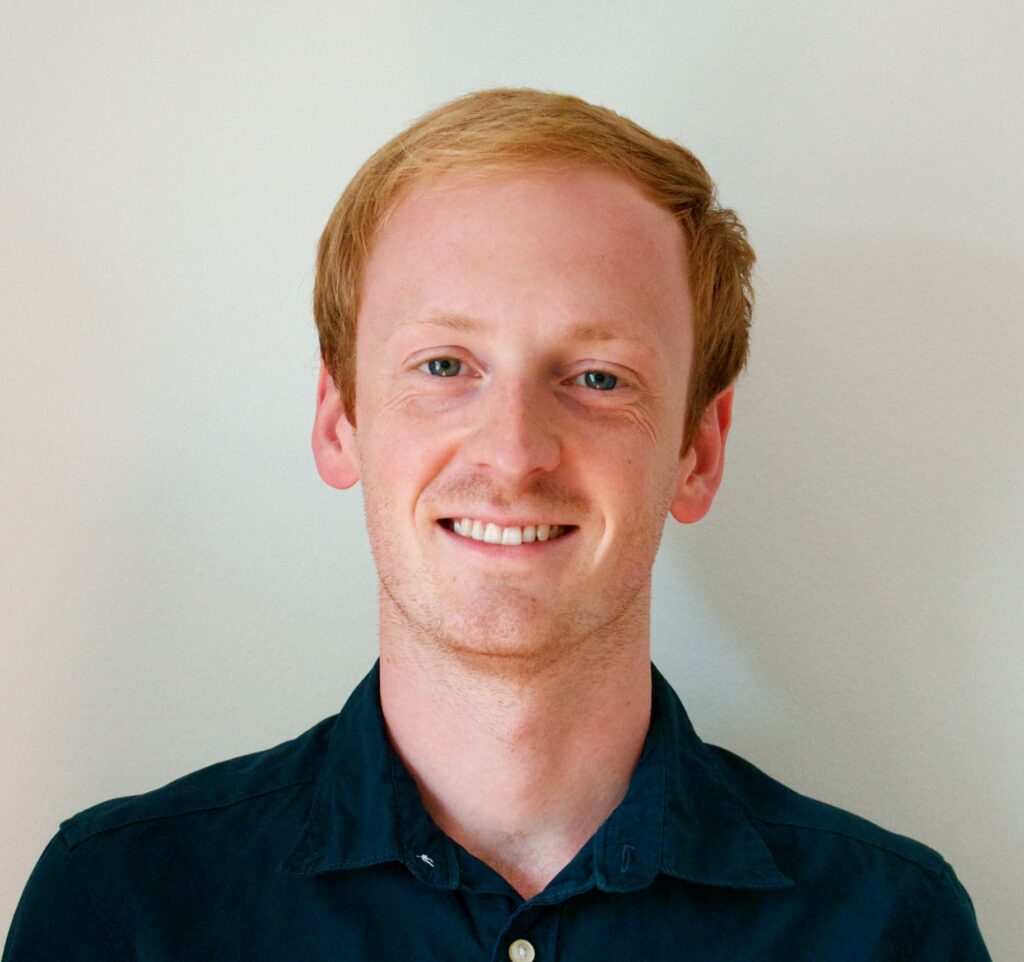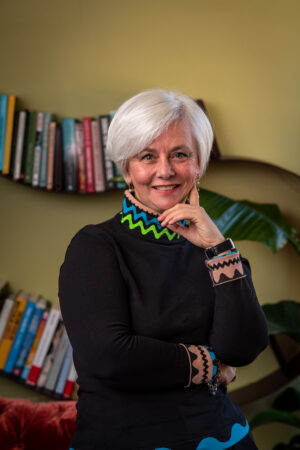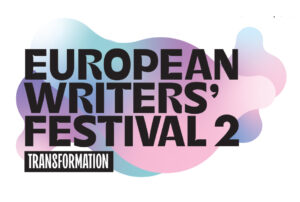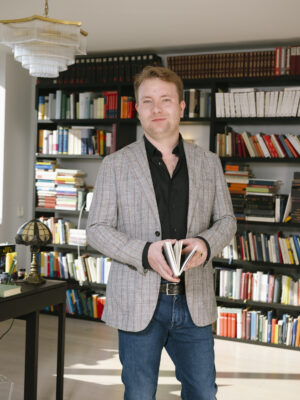Benjamin Quaderer’s novel Forever The Alps is a story of international intrigue. The publisher describes it as a ‘daring debut on the power of money and the power of storytelling’. The book is inspired by Liechtenstein’s tax scandal – their Panama Papers equivalent – but it also provides a snapshot of life in the tiny nation.
Dr Seán Williams spoke to Benjamin Quaderer back in 2020 for the Austrian Cultural Forum’s Literature in Lockdown series. We are happy to publish some of their conversation below, as translated from German into English by Jozef van der Voort. This piece appears on our website in advance of what promises to be a great discussion event on the book at the ACF next month.
Seán Williams: It’s a pleasure to speak to you Benjamin. Your novel is a playful and (despite its length) pacy account of the life of a data thief, and is based on a true story: that of Heinrich Kieber. Why did Kieber of all people inspire you to write your book?
Benjamin Quaderer: Perhaps I should explain some of the background. Heinrich Kieber stole customer data from a bank in Liechtenstein – the bank that belongs to the Prince, in fact – and the story broke on 14 February 2008. That was Valentine’s Day, and also the birthday of Hans-Adam II, the Prince of Liechtenstein. I was 19 years old, living in Liechtenstein, and getting ready to leave the country. This story was an incredibly big deal for a tiny country like Liechtenstein because it triggered an international tax scandal, and in that sense it was constantly on my radar. I moved away to Vienna and later to Hildesheim in Germany in order to study creative writing, but I always knew I wanted to write something about Liechtenstein. Yet although I kept trying, I couldn’t quite get it right, until a few years later I stumbled upon Heinrich Kieber – or rather, the figure of the data thief in the abstract – and I realised I could use this figure not just to write an amazing biography, but also to tell the story of the entire nation of Liechtenstein.
My God, something big is heading our way…
S: Thinking back to 2008, when Kieber and the Liechtenstein tax scandal hit the headlines across the world: how did Liechtensteiners react as the story played out in the media? How did it effect people from day to day?
B: It all began with a bolt from the blue, when live TV cameras filmed police raiding a house in a wealthy suburb of Cologne on the morning of 14 February and arresting Klaus Zumwinkel, who at that time was Chairman of Deutsche Post. During the course of the day it then became clear that the arrest had to do with tax fraud and Liechtenstein, and that was the big bang – suddenly the whole of Liechtenstein was talking about it. I remember a few days later, while I was at school, a teacher held up the front page of a newspaper and said, “My God, something big is heading our way.” So people were definitely aware that something serious had just happened.
S: And so you wanted to write about this society, about these Liechtensteiners. In your description, Liechtenstein isn’t just a tax haven or a ski resort; instead, you paint a wideranging and critically engaged picture of the country. Was that your goal from the outset, or did this social aspect only come into play after you started writing?
B: No, it was definitely important to me to point out that Liechtenstein isn’t just a financial centre. I mean, it is a financial centre – that’s actually a big part of what the country is – but it’s so much more than that too, and I felt I wouldn’t have done the place justice if I’d focused entirely on banking. Although Liechtenstein is a tiny country, it has many different dimensions, and I thought it would be interesting to make space for that.
S: Perhaps we should mention that your novel covers many different social groups, and that Liechtenstein is depicted as a small but also conservative Catholic country – women were only granted the right to vote in 1984, for example. All these aspects feature in your novel.
B: Yes. I kept thinking – partly as a joke – that although a small amount of literary fiction has been written about Liechtenstein, there isn’t awful lot of it, and so I imagined I was writing the “great Liechtensteinian novel.” That was never a serious idea, but then I thought, “OK, why not adopt that mindset and really try to capture the entire country?” It was a kind of folie de grandeur, but I think it’s very much in keeping with the narrator of the book, and I also liked the idea of one of the smallest countries on Earth producing a novel written with such delusions of grandeur.
S: Brilliant. But of course, both the novel and the life of Johann Kaiser (the protagonist) extend far beyond the borders of Liechtenstein. As a child, Kaiser plays a game with his friend in the forest where they try not to fall over the border into Austria. As a teenager and adult, Johann then emigrates multiple times, and we read about many different countries. What global phenomenon or problem were you engaging with there? It seems to me like you were writing about a cosmopolitan elite that avoids paying tax, for example.
B: I think there are two aspects to this. One relates to the protagonist himself, to Johann Kaiser, who grows up in Liechtenstein and quickly starts to find it stifling. He sees himself as a very international person, and that’s something I find interesting as Liechtenstein covers 60 square miles. That’s nothing – you can drive all the way across it in half an hour. It’s minuscule, and I think people who grow up in a tiny country like Liechtenstein perhaps have a different sense of how big the world is. I have the impression that the world as a whole feels much bigger to a Liechtensteiner than to somebody who grew up in the USA, because Americans can go on holiday within their own borders and it’s impossible for them to visit every corner of the country. So that’s one aspect.
S: That explains the epigraph you chose by Rheinberger. Could you perhaps read it to us, or say a few words about it?
B: The person I quoted, Hans-Jörg Rheinberger, is a molecular biologist and philosopher. The epigraph reads: “When one comes from a small nation, when almost everywhere in the world is a foreign country, one is in a certain sense an ephemeral event.” I think that’s probably a much more elegant summary of what I was trying to say just now.
S: You made a comparison with the USA, or with people who grow up in the USA. Was that a reference to an essay by Friedrich Dürrenmatt?
B: No, I don’t think so. What do you mean? Which essay?
S: He wrote a tongue-in-cheek piece comparing a Liechtensteinian writer to American authors, which sprang to mind while you were talking.
B: Ah yes, I know the piece you mean and it was actually very important to me, you’re right. But I wasn’t thinking about it when I mentioned the USA just now.
S: Do you see yourself as a Liechtensteinian author?
B: I don’t really know – but I don’t find it important either. The funny thing about my background is that… This is my first book, and it says in my bio that “Benjamin Quaderer was born in 1989 in Feldkirch (Austria) and grew up in Liechtenstein.” Feldkirch is a town located five minutes across the Austrian border. That means people see me as an Austrian author, simply because I was born there, and yet I actually feel much more connected to Liechtenstein. I’m a citizen of both countries. So I’m not actually sure what I am, but it isn’t particularly important to me either.
I find Heinrich Kieber interesting in terms of what he represents. He was bound up with every layer of society in Liechtenstein, but he’s also the man who brought Liechtenstein to its knees and put an end to the country’s status as a tax haven, which is what it was before 2008.
Benjamin Quaderer
S: Your protagonist Johann Kaiser is obviously preoccupied with questions about identity, and also with his own identity, which is extremely flexible and portrayed in a picaresque way. And you were inspired by the life of Heinrich Kieber, which has been told many times. There’s a non-fiction book about him as well as a documentary, and Kieber has even written his own account of the story. What exactly is involved in researching a novel like yours?
B: In my case, it involved extremely intensive study of the available texts. That means the non-fiction book you mentioned – Der Datendieb (The Data Thief) by Sigvard Wohlwend – as well as the film of the same name by Wohlwend and Sebastian Frommelt, and also the text written by Heinrich Kiebe himself, which is called Der Fürst, der Dieb, die Daten (The Prince, The Thief, The Data). Those three things were sort of my bible; I read them very closely, over and over again. I also visited the places from Kieber’s life, from his biography, that seemed interesting to me. But the longer I spent studying Heinrich Kieber, the further I moved away from him and the closer I came to Johann Kaiser, because the two aren’t identical, although there are similarities between them. I find Heinrich Kieber interesting in terms of what he represents. He was bound up with every layer of society in Liechtenstein, but he’s also the man who brought Liechtenstein to its knees and put an end to the country’s status as a tax haven, which is what it was before 2008.
S: It’s clear that you’ve done a lot of research from the many footnotes in the novel. Then again, can’t these also be construed as part of the fiction – as evidence in the general sense of the word? After all, Kaiser is a very unreliable and playful narrator.
B: That’s right, the footnotes have a dual function. On the one hand, Johann Kaiser is writing this text under witness protection and he wants to persuade the reader that what he’s saying is the truth. And how can you prove that something is true? By adding footnotes. And then there’s the function that footnotes have for the author, which is partly to admit and make clear that the story isn’t entirely my own – that it’s based on something else, that it’s been researched – but partly also to show the reader what sources I used.
S: From both the form and the content of the novel, it was obvious to me that you’re very well read. Are there any authors that were particularly important to you while you were writing?
B: There was one particular moment of awakening in my life as a reader, and that was when I discovered Roberto Bolaño. He’s a very important author for me because he has a very casual style, but he writes these incredibly dense texts that take in the whole world. And actually Dürrenmatt is also important to me, because I like his laconic, pared-down elegance. And David Foster Wallace is definitely important too.
S: Excellent! One of my favourite authors. But we should also point out that you don’t solely respond to literary authors in your novel; you also mention and engage with historians of Liechtenstein. The novel reads like a kind of history book. You write: “The cowsheds of the past became the financial institutions of today”. Liechtenstein was once one of the poorest countries in Europe, as we learn from your novel, and you give us a rough history of the nation.
B: Yes, and that was important to me because I think you can only understand Liechtenstein if you engage with its history. Liechtenstein is now one of the richest nations in the world – maybe even the richest – and that happened within a hundred years. Liechtenstein has transformed itself relatively quickly from one of the poorest nations in Europe to one of the wealthiest. And I’m interested in what that does to people’s minds, to their psyches. After all, we’re talking about nouveau riches who suddenly come into a huge amount of money, but still have an agrarian mindset. I find that an incredibly interesting situation – people suddenly having so much money that they might have no idea what to do with it all. I find that idea of sudden wealth fascinating.
S: What makes the Principality of Liechtenstein and its history unique is, of course, the Prince. And Hans Adam II isn’t depicted flatteringly in your story. He’s portrayed as fiery, stubborn and quick to anger – not just from Kaiser’s point of view, but also from that of the forensic psychologist, although the latter’s words are woven into Kaiser’s story. Do you think we – ironically – have too romantic a view of the monarchy in real life?
B: Who do you mean by ‘we’?
S: Or do you think literature should cast a critical eye at monarchs?
B: I don’t know. I don’t think literature should be or do anything. For me, the funny thing is that monarchy quickly assumes a kind of fairy-tale aspect, because that’s something that doesn’t really exist anymore.
S: And that’s partly connected to Liechtenstein’s self-image, right? The fact that it’s a romantic, traditional country that’s been ruled over by a Prince for over 300 years, and so on.
B: Yes. Liechtenstein – I mean the whole setup – is quite simply a fairy tale. There are 11 villages, there’s a castle overlooking Vaduz that’s home to the Prince. It sounds so unreal. Yet for Liechtensteinians, for the people who live there, it’s all perfectly normal and natural. I wanted to present the fairy tale as a fairy tale, and at the same time bring the fairy tale into the real world – to shake it up and see what’s left of it.
I really believed in the material, in the story, and I felt it needed to be told.
Benjamin Quaderer
S: Für immer die Alpen is a madcap, thrilling and bizarre story (in a very positive sense). What kept you grounded while you were working on it? In other words, how did you avoid going crazy?
B: I think what stopped me going crazy was that I really believed in the material, in the story, and I felt it needed to be told. I wasn’t always sure I was the right person to tell it, but I knew it was an incredible story that deserved attention. I think that was always my hope – I kept telling myself, “Yes, this needs to be told! It’s just got everything.” I felt a sort of obligation towards the material.
S: I think you were very successful. I really enjoyed reading the novel, and I’ve very much enjoyed talking to you too. Thank you Benjamin!
B: Thank you too!
You can listen to this conversation in German via the Austrian Cultural Forum website here. Translator Jozef van der Voort transcribed and translated the conversation as it appears above and at this link. Thanks to both of them, as well as to the ACF, for allowing the conversation to be published here.
Benjamin Quaderer and Seán Williams will be talking about this fascinating the book at a bilingual reading and discussion hosted by Dr Andrea Capovilla at the ACF in London SW7 on Wednesday 4th October at 7pm. Further information and tickets for the event are available here.
Benjamin Quaderer was born in 1989 in Feldkirch, Austria, and grew up in Liechtenstein. He studied creative writing in Hildesheim and Vienna. He previously co-edited the literary journal BELLA triste and was a member of the artistic committee for the Prosanova 2014 youth literature festival.

Dr Seán Williams is Senior Lecturer at the University of Sheffield, and a specialist on German and European Cultural History. He covered the Principality of Liechtenstein for The Economist on the state’s 300th anniversary.
You can read NBG’s interview with Seán here or find out more about him on the Univeristy of Sheffield website here.

Jozef van der Voort is award-winning literary and academic translator working from German and Dutch into English. He is a translator and editor at the German Historical Institute in London. You can find out more about Jozef at his website.
For more great Austrian literature, please click here.









